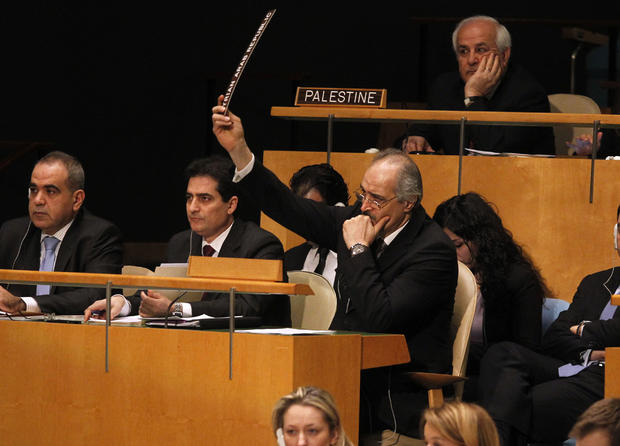U.N.: Syria's crimes against humanity continue
Last Updated 2:22 p.m. ET
UNITED NATIONS - The U.N. human rights chief said Monday that the Syrian government's violent crackdown on civilian protesters indicates crimes against humanity have taken place since last March and are continuing.
Navi Pillay expressed serious concern that the deliberate stirring of sectarian tensions may plunge Syria into civil war. She again appealed for President Bashar Assad's government to be referred to the International Criminal Court.
Standing before the 193-member General Assembly, Pillay said the Security Council's failure to agree on action against Syria appears to have emboldened the government "to launch an all-out assault in an effort to crush dissent with overwhelming force."
She echoed Secretary-General Ban Ki-moon's warning that council inaction must not be used as a license to step up deadly attacks on civilians, and she decried the ongoing assault on the central city of Homs, which reportedly has killed 300 people in the last 10 days.
"The nature and scale of abuses by the Syrian government indicate that crimes against humanity are likely to have been committed since March 2011," Pillay said.
"Independent, credible and corroborating accounts indicate that these abuses have taken place as part of a widespread and systematic attack on civilians," she said. "Furthermore, the breadth and patterns of attacks by military and security forces on civilians, and the widespread destruction of homes, hospitals, schools and other civilian infrastructure indicate approval or complicity by authorities at the highest level."
CBS News foreign affairs analyst Pamela Falk reports the General Assembly heard today from member states, responding to the Arab League's call for a joint U.N.-Arab nation peacekeeping force, "but action on any force would have to take place in the Security Council, which remains deadlocked, leaving the Arab League to decide to send troops or continue to send arms without U.N. authorization."
Pillay stepped to the podium after a lengthy failed attempt by Syria to prevent her appearance.
Syria's U.N. Ambassador Bashar Ja'afari argued Monday's meeting was illegal because the General Assembly resolution establishing the Geneva-based Human Rights Council only allows the human rights chief to report once during its session.
Ja'afari called for an independent legal opinion, saying there was a suspicion of partiality by Assembly President Nassir Abdulaziz Al-Nasser. Ja'afari, however, refused to call for a vote, and Al-Nasser gavelled the meeting to order.
Syrian rebels claim to repel attack on town
Clarissa Ward on reporting from Syria
Al Qaeda urges Muslims to help Syria rebels
The General Assembly is expected to consider a nonbinding resolution similar to the Security Council resolution that Russia and China vetoed, backing an Arab League plan that calls for Assad to hand power to his vice president and allow creation of a unity government to clear the way for elections. There are no vetoes in the assembly, and diplomats said a vote could take place late this week.
Pillay said credible reports indicate more than 5,400 people were killed last year, including military personnel who refused to shoot civilians.
Due to the extreme difficulty in verifying events on the ground, "it has become almost impossible for my office to update the death toll in the past two months," she said. "However, we are certain that the number of dead and injured continue to rise every day."
She said tens of thousands of people, including children, have been arrested, more than 18,000 reportedly are still arbitrarily detained, and thousands more are reported missing. In addition, she said, 25,000 people are estimated to have sought refuge in neighboring countries, and more than 70,000 are estimated to be internally displaced.
"The Russia and China double veto, blocking action by the U.N. on Syria earlier this month has created a Cold War era sphere-of-influence battle, pitting the U.S. and the West along with the Arab League countries against Russia and China with ally Iran - in what may become a prolonged Syrian civil war," CBS News' Falk said.
